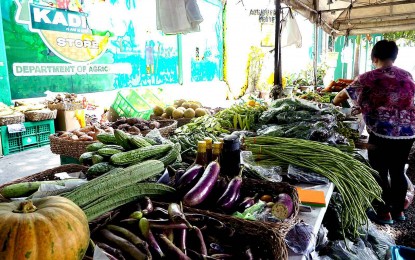
'HOPEFUL'. Bruce Tolentino, a member of the Bangko Sentral ng Pilipinas' policymaking Monetary Board said on Saturday (May 6, 2023) he is hopeful for the stabilization of food and oil prices, noting that this would reduce the need to request a wage hike, which, in turn, is among the secondary effects of inflation. The impact of the looming El Niño phenomenon is expected to affect inflation but Tolentino said the gravity of the dry spell depends on when and where it would hit. (PNA file photo)
CLARK FREEPORT, Pampanga – A member of the Bangko Sentral ng Pilipinas' (BSP) policy-making Monetary Board (MB) has expressed hope that the prices of food and oil-related products would stabilize as soon as possible to reduce the secondary effects of inflation.
This, as higher food and oil prices continue to impact consumers' purchasing capacity, among others, hence, the petitions for wage hikes.
MB member Bruce Tolentino, during the business journalism seminar here on Saturday, hosted by the Economic Journalists Association of the Philippines in coordination with San Miguel Corp., said higher transport fares and wages are among the effects of acceleration in the rate of price increases.
"And principal item that we worry about is when the labor unions and the wage bargaining boards start to agitate for higher wages because food is expensive," he said.
This situation, he said, is already happening in several regions, "so we're hoping that it does not spread to all the regions."
"And we hope that food prices will moderate sooner than later so that the pressure to ask for more (wage hikes) moderates," he said.
Tolentino noted that wage increases that have been approved by the labor department and the regional wage boards to date "have been roughly keeping up with the rate of inflation.”
In April, the rate of price increases slowed for the third straight month to 6.6 percent after hitting a 14-year high of 8.7 percent in January.
Average inflation in the first four months of the year stood at 7.9 percent.
Monetary authorities forecast inflation to remain above the government's 2 percent to 4 percent target until the third quarter of this year, with the average inflation for the year seen at 6 percent.
Tolentino said food inflation and energy prices, in general, determine the path of the consumer price index (CPI).
Analysts and authorities expect inflation to remain sticky given that core inflation, which excludes food and oil-related items, remains high.
The MB member said food items alone account for about 38 percent, on average, of CPI in recent years.
He said this is higher compared to other countries.
With the looming El Niño phenomenon, which is projected to hit the country starting June or July this year and is forecast to last until the first quarter of 2024, pressures from food prices are seen to remain up.
Tolentino said the impact of the dry spell on inflation depends on when and where it would hit.
"If it hits early in the planting season, that means that most of the crop will be wiped out. If it hits later then a smaller level of the crop will be affected," he said, citing that "it also depends on where the drought will be."
He said mitigating measures, such as knowing weather patterns, are so important to cushion the impact of the dry spell, highlighting the need for more investments in infrastructure related to irrigation and water management.
With inflation seen to remain elevated, Tolentino said a 25 basis points increase in the BSP's key rate during the rate-setting meeting of the MB on May 18 is possible.
The projected rate hike is similar to the latest uptick in the Federal Reserve's key rates, and Tolentino said the rate action of the Fed "is always a factor that we need to consider because if the (interest rate) differential in US rates are higher, then it attracts money to go to the US."
He, however, pointed out that there are other factors in their policy stance assessment and this includes the changes in food prices.
"If all of a sudden food prices fell much greater due to some miracle, then we might not do it. Again, as we always say, it (policy rate decision) depends on the data," he said. (PNA)
